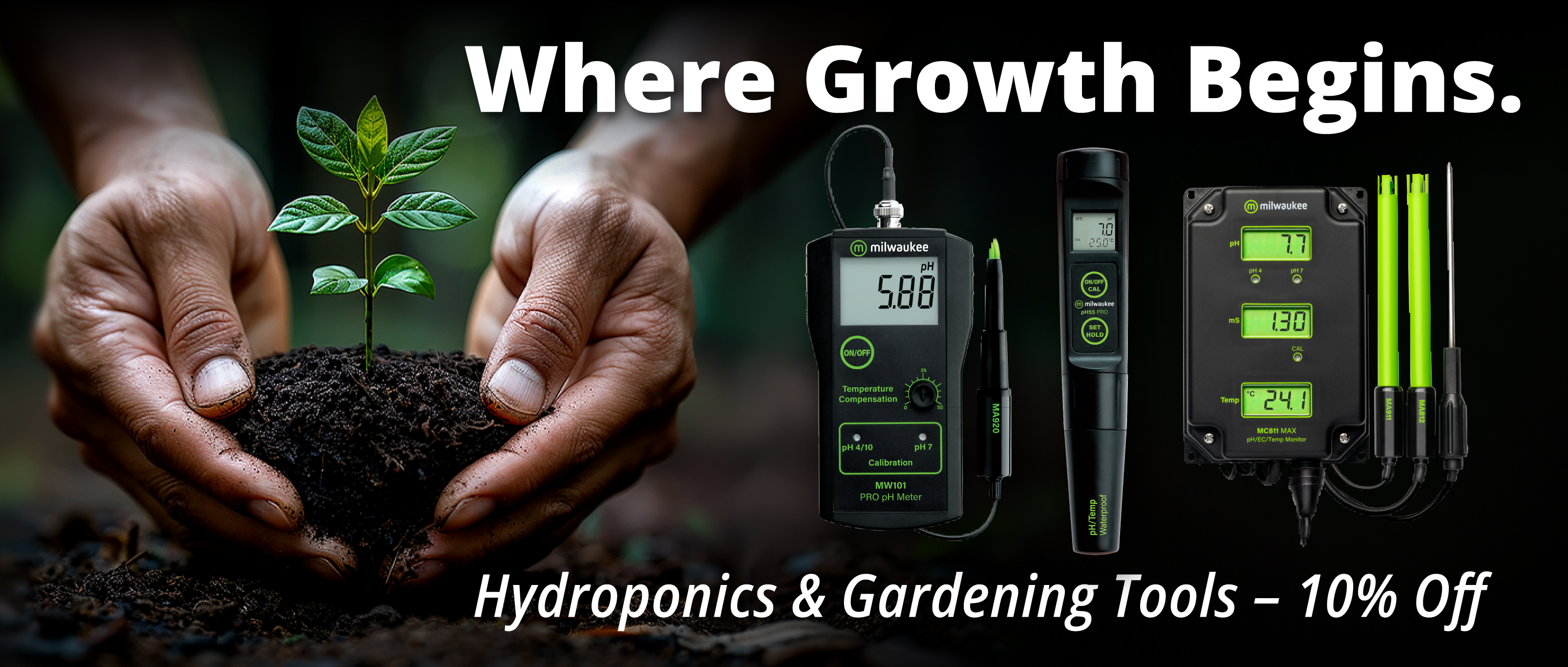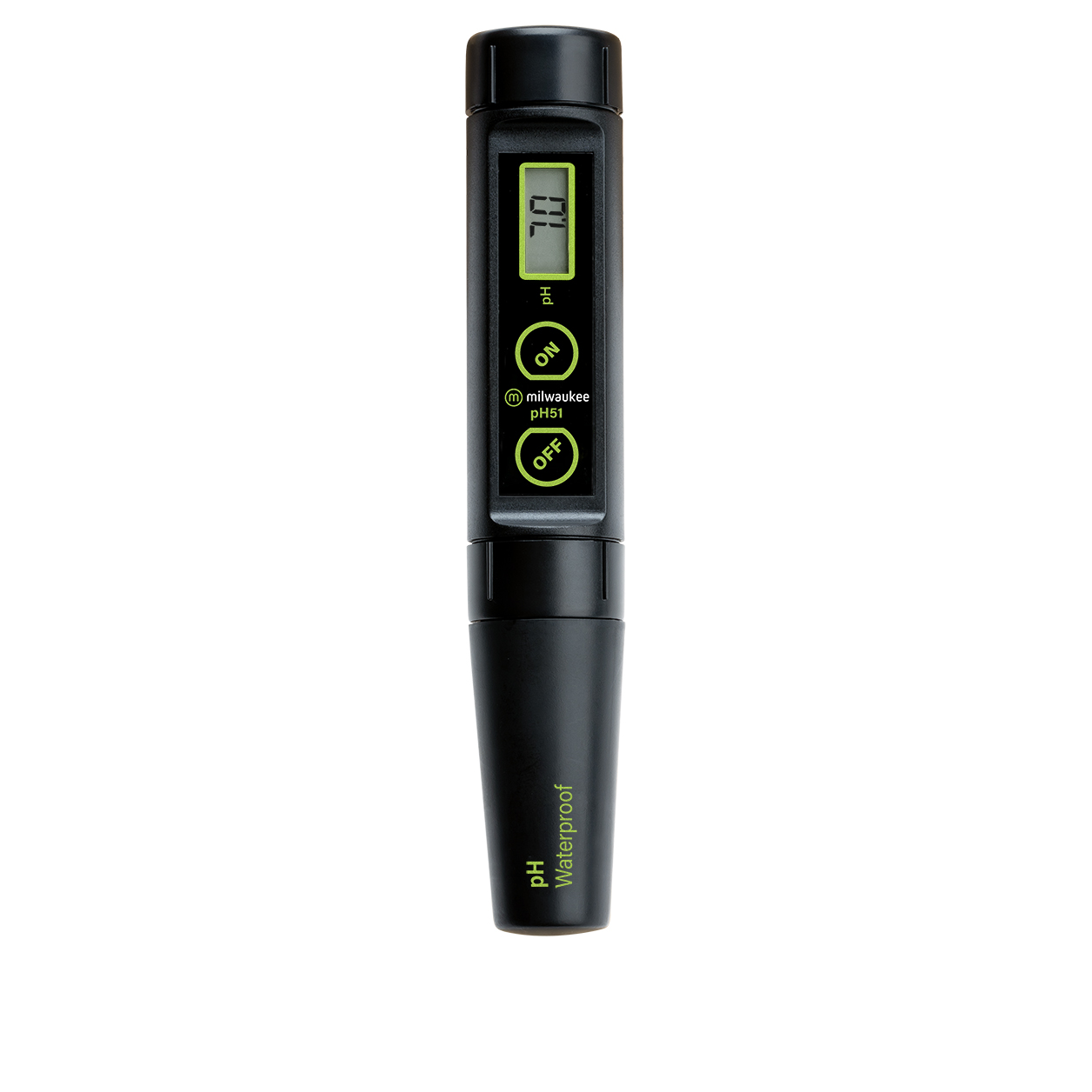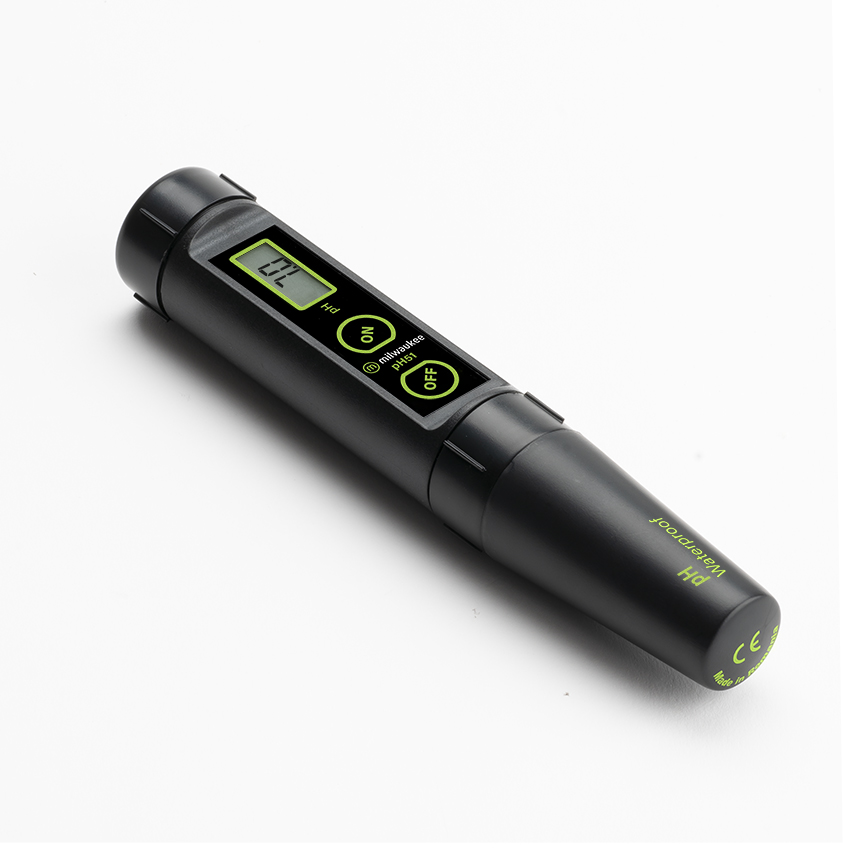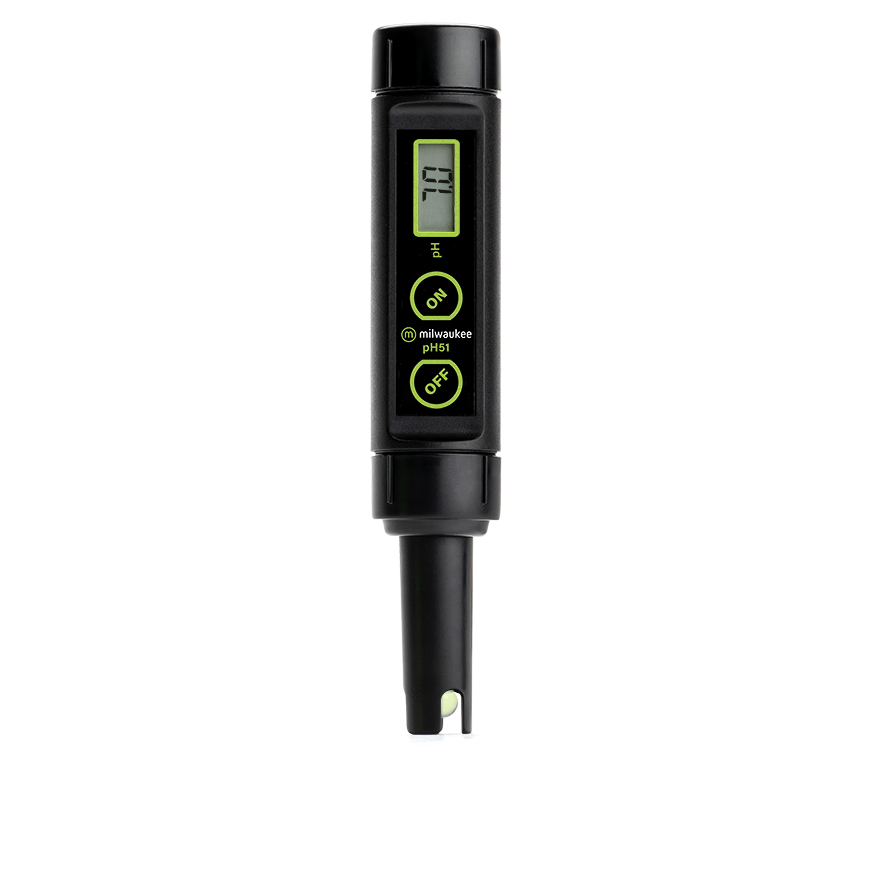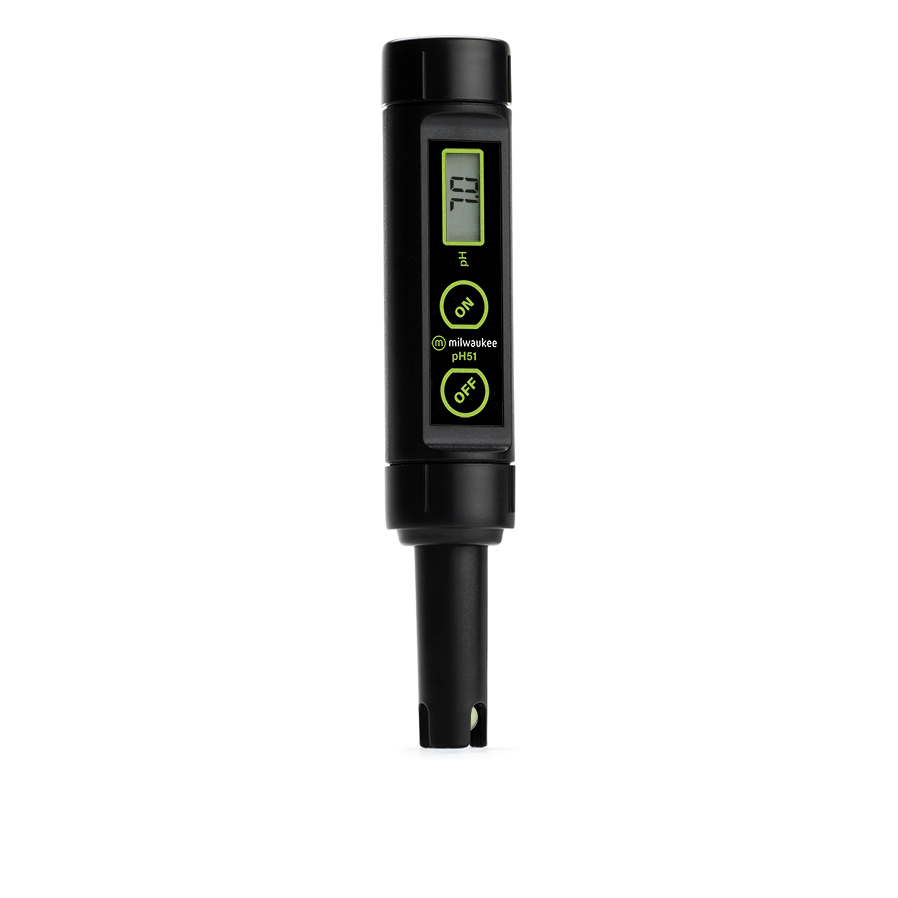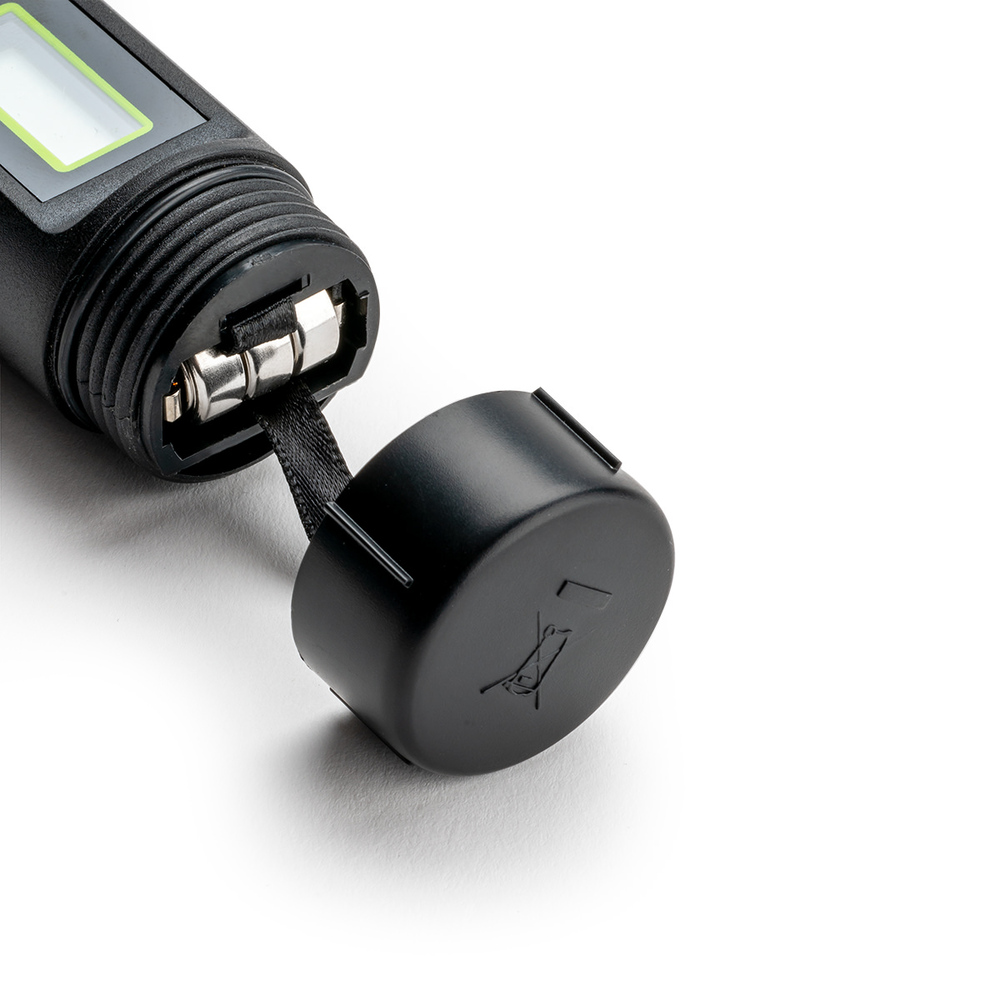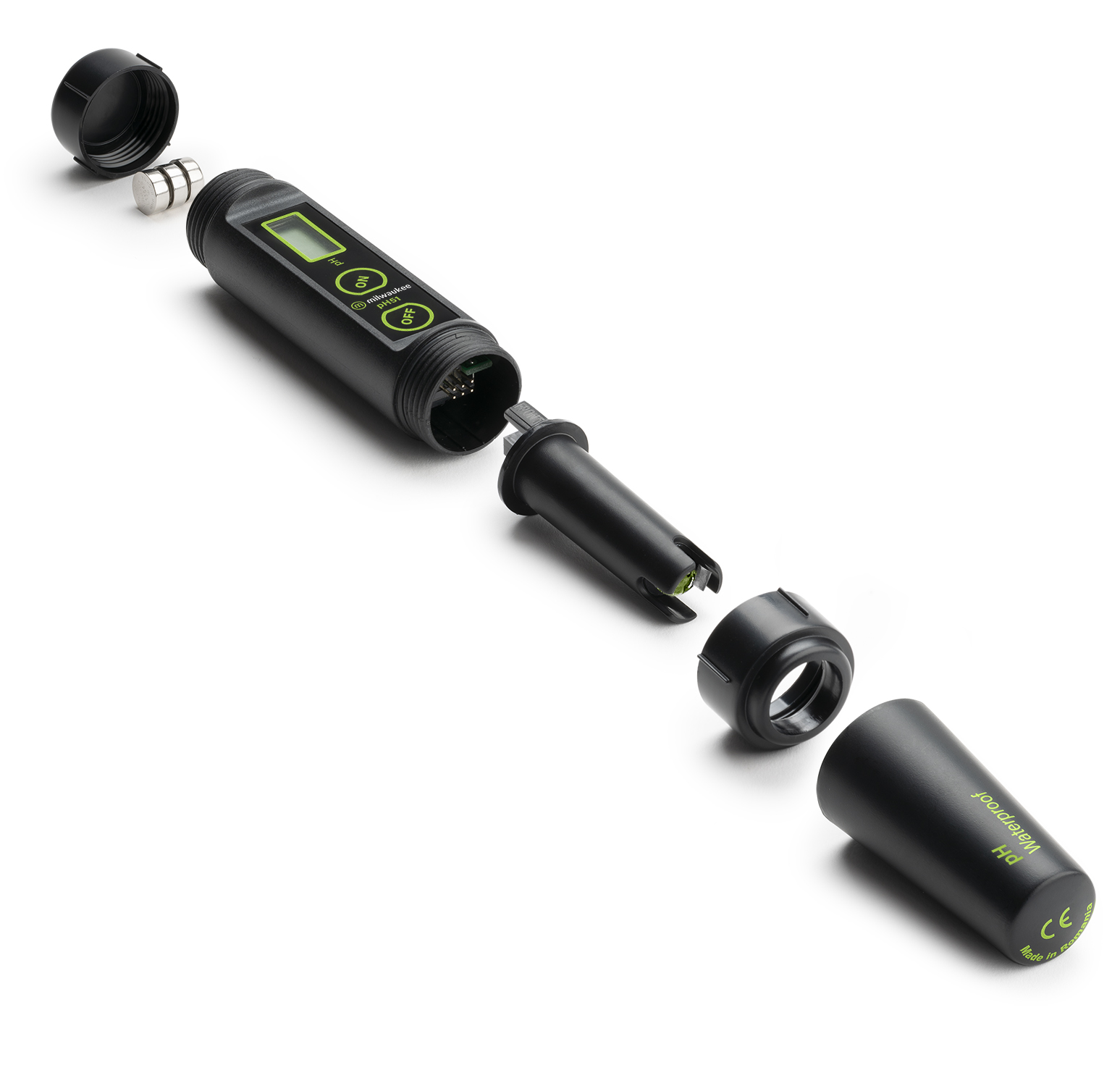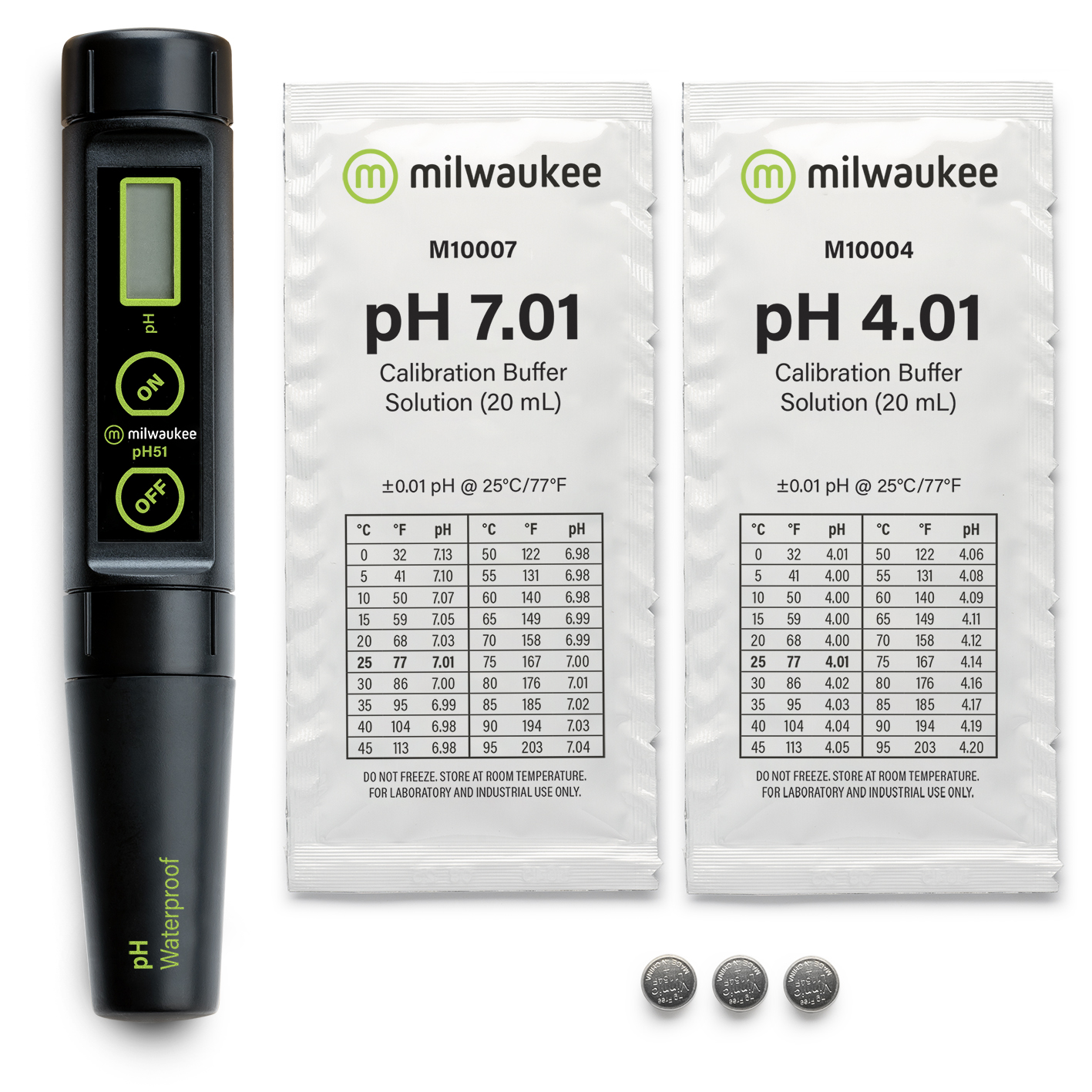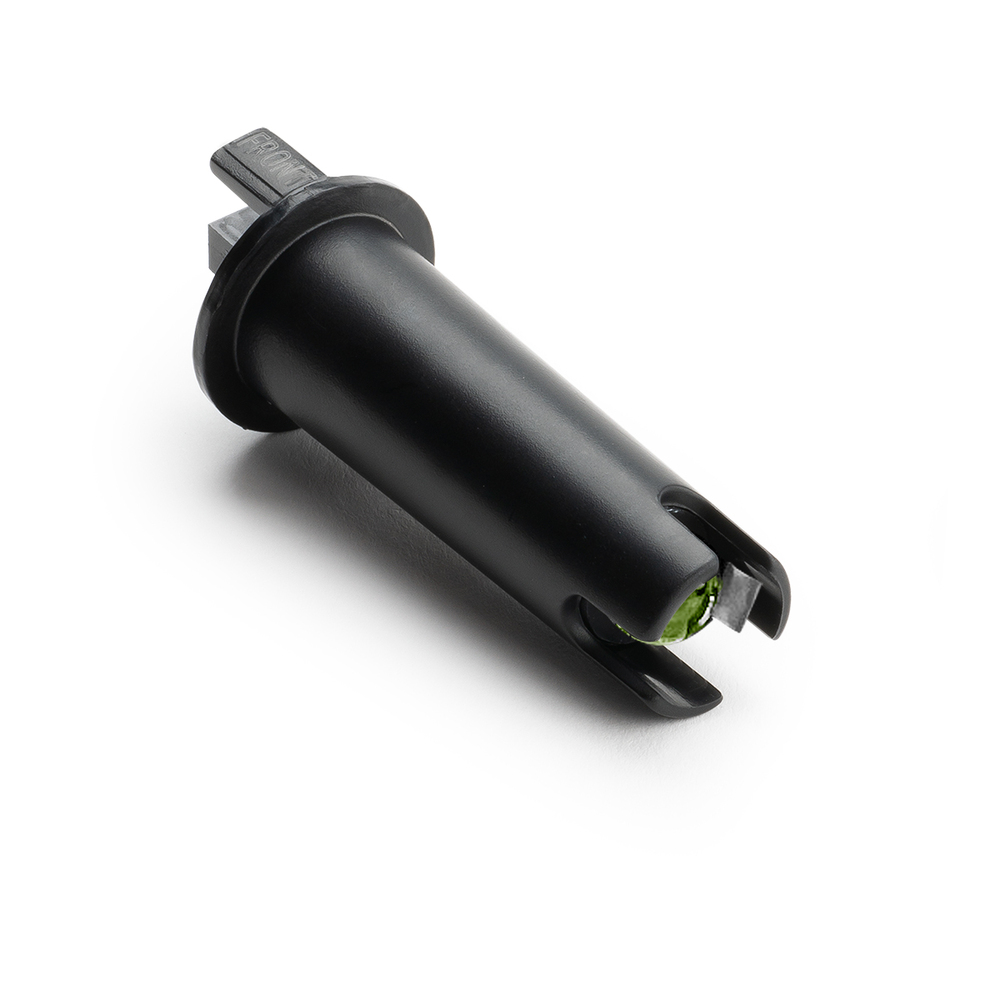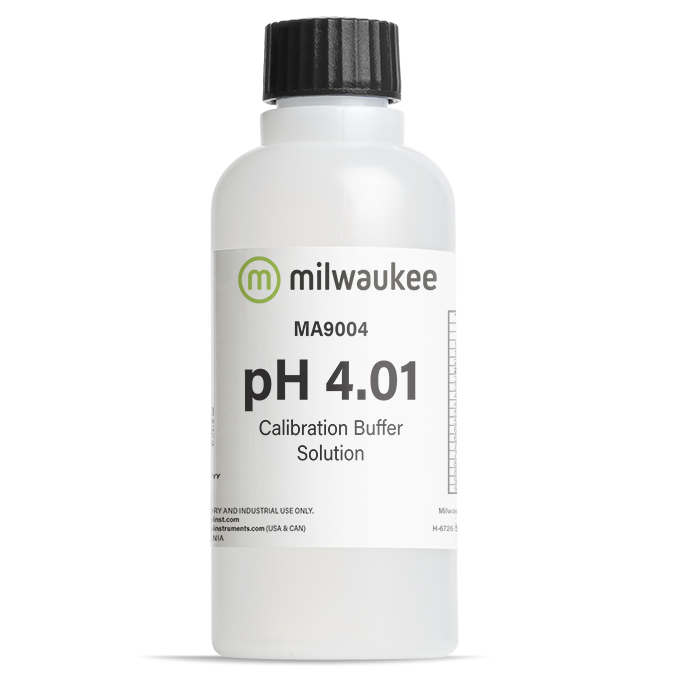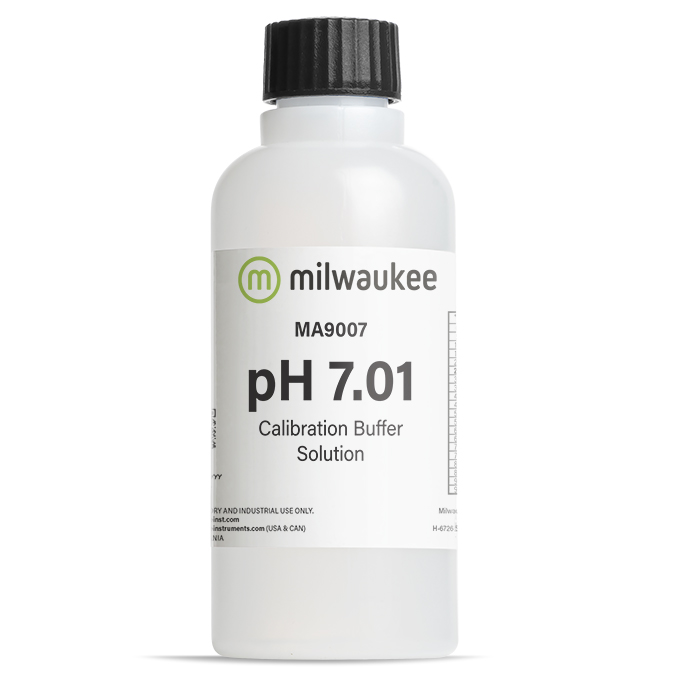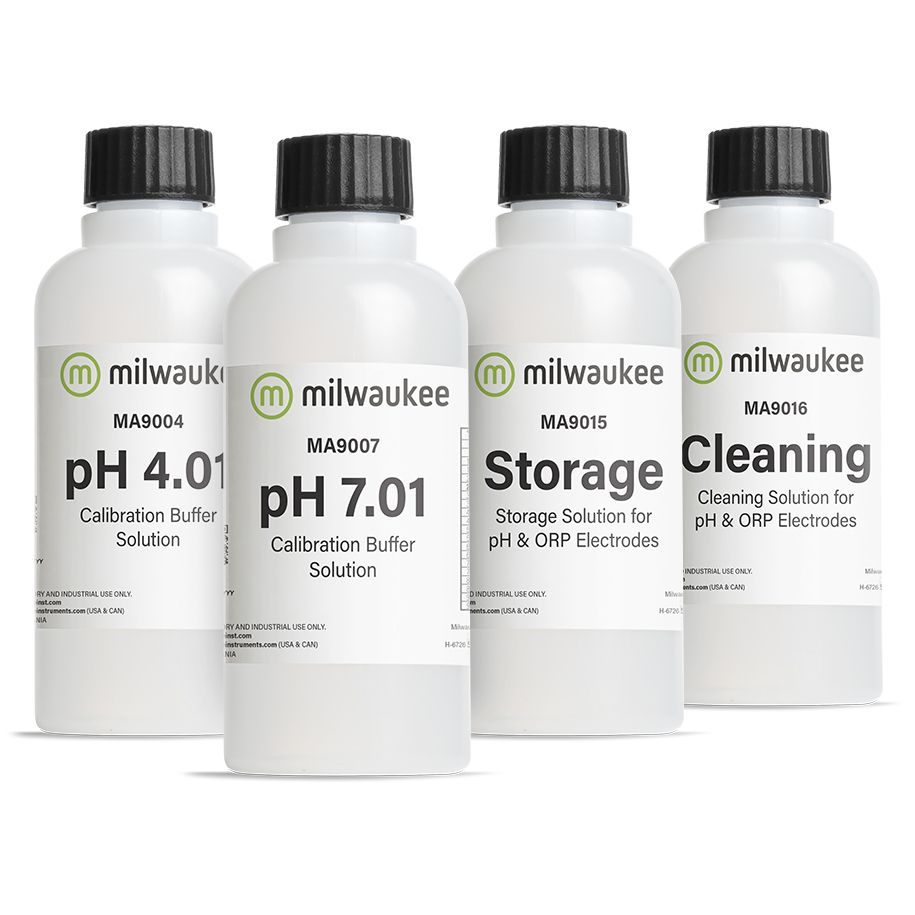Your shopping cart is currently empty.
Milwaukee PH51 Waterproof pH Tester – Reliable Simplicity for Everyday pH Control
Whether you're fine-tuning your hydroponic nutrient mix, balancing the water chemistry of your aquarium, or managing the pH of irrigation or swimming pools, accuracy matters. The Milwaukee PH51 is the go-to tester for hobbyists and professionals alike who need dependable pH readings on the go, without the bulk or complexity of a bench meter.
Built with user convenience in mind, the PH51 combines waterproof durability, simple calibration, and a replaceable probe in a pocket-sized design. This tester is made for real-life use—out in the garden, by the pool, or at the fish tank—where conditions aren’t always perfect, and tools need to keep up. Whether you're just starting out or have years of experience, the PH51 delivers confidence in every reading, helping you maintain stable environments where water quality is crucial.
The large digital LCD makes readings quick and easy, while the protective cap and included calibration solution set you up for success from the first test. With ±0.1 pH accuracy and a range of 0.0 to 14.0 pH, this compact meter is perfect for fast checks and routine monitoring—without cutting corners on reliability.
Why Choose the Milwaukee PH51?
- Waterproof Durability: Rated IP65, the PH51 is built to handle splashes, spills, and real-world conditions with ease.
- Replaceable Electrode: Features the MA73600 double-junction pH probe, which can be swapped out when needed—extending the life of your meter.
- High Accuracy: Measures from 0.0 to 14.0 pH with ±0.1 accuracy for dependable results every time.
- User-Friendly Operation: One-button calibration and a simple interface make it easy to use for beginners and pros alike.
- Compact & Portable: Lightweight design fits in your pocket or toolbox—ideal for spot checks in the field or lab.
- Complete Starter Kit: Includes protective cap, batteries, and pH 7.01 calibration solution so you can start testing immediately.
Applications
The Milwaukee PH51 is designed to support a wide variety of applications where pH measurement is critical to water quality and performance:
Aquariums & Aquaculture
Maintaining optimal pH levels is vital to the health of fish and aquatic plants. The PH51 helps aquarium hobbyists and fish farmers monitor water conditions for thriving aquatic ecosystems.
Hydroponics & Horticulture
pH affects nutrient availability in soilless growing systems. Use the PH51 to ensure nutrient solutions remain within the ideal pH range for plant uptake, promoting healthy growth and better yields.
Agriculture & Soil Testing
Soil and irrigation water pH significantly influence crop performance. The PH51 allows quick on-site testing to optimize fertilizer effectiveness and soil conditions.
Swimming Pools & Spas
Balancing pH in pool and spa water is essential for user comfort, disinfection efficiency, and protecting surfaces and equipment. The PH51 provides fast, reliable checks for home or commercial pool owners.
Environmental Monitoring
For field researchers and technicians testing lakes, rivers, or groundwater, the PH51 offers portable precision in challenging outdoor environments.
Education & Laboratories
From classroom experiments to routine lab work, the PH51 offers a simple and effective tool for introducing pH measurement without the cost and complexity of high-end instruments.
Food & Beverage Production
In small-scale brewing, winemaking, or food processing, pH affects flavor, fermentation, and safety. The PH51 is a trusted tool for quick checks during production.
Proper Care & Maintenance
To maintain the performance and extend the lifespan of your PH51 pH tester, follow these essential care tips:
- Rinse After Use: Always rinse the electrode with distilled water after testing to avoid residue buildup and cross-contamination.
- Store Correctly: Keep the probe moist using proper storage solution inside the cap. Avoid letting the electrode dry out.
- Calibrate Regularly: Perform calibration frequently, especially if testing across a wide pH range or in critical applications. Use fresh buffer solutions (typically pH 7.01 and 4.01 or 10.01).
- Replace Probe as Needed: When readings become unstable or response time slows, consider replacing the MA73600 probe to restore accuracy.
- Avoid Extreme Temperatures: Store and use the tester within recommended temperature ranges to prevent damage to the probe and electronics.
For quick, accurate pH measurements in any environment, the Milwaukee PH51 delivers professional-level performance in a compact, user-friendly format. Whether you’re growing, swimming, brewing, or studying, this rugged little tester is your daily tool for reliable results.
Specifications
Application
Hydroponics & Agriculture
A pH tester for hydroponics and agriculture is a vital tool for ensuring that plants receive the correct nutrient balance for optimal growth. In hydroponics, where plants are grown in nutrient-rich water rather than soil, maintaining the right pH is crucial for nutrient uptake. Plants rely on a specific pH range to absorb essential nutrients effectively; if the pH is too high or too low, certain nutrients become unavailable, leading to nutrient deficiencies or toxicity.
For hydroponic systems, the pH range typically needs to be between 5.5 and 6.5, depending on the type of plants being grown. If the pH falls outside this range, plants may struggle to absorb nutrients like nitrogen, phosphorus, and potassium, which are critical for healthy growth. This imbalance can result in poor plant health, reduced yields, and slow growth. Regular pH testing allows hydroponic growers to make quick adjustments, ensuring their plants have access to all the nutrients they need.
In traditional agriculture, pH plays a similarly important role in soil health. The pH of the soil affects the availability of micronutrients and macronutrients like nitrogen, potassium, and phosphorus. Soil that's too acidic or too alkaline can lead to nutrient deficiencies, poor crop performance, and weaker plants that are more susceptible to diseases.
The PH51 pH tester helps growers maintain the ideal pH range for both hydroponic and agricultural applications. With its precise and reliable measurements, it enables growers to quickly adjust pH levels, ensuring plants are thriving and maximizing yield potential, whether in a soil-based or soilless growing environment.
How to Use in Hydroponics:
- Calibrate using pH buffer solutions.
- Insert the probe into your nutrient reservoir.
- Wait for the stable reading and adjust if needed.
- Clean and store properly after each use.
Aquariums & Fish Keeping
A pH tester for aquariums is essential for maintaining a stable and healthy environment for fish and other aquatic life. pH levels directly influence the health of fish, plants, and beneficial bacteria that live in the tank. If the water's pH is too high (alkaline) or too low (acidic), it can stress fish, make them more susceptible to diseases, and disrupt their normal behavior.
In freshwater aquariums, pH can fluctuate due to factors like water changes, substrate, and tank decorations. In saltwater aquariums, pH is equally crucial, as marine life is highly sensitive to shifts in water chemistry. Monitoring and maintaining the right pH level ensures fish thrive, prevents illness, and promotes a balanced ecosystem.
For hobbyists and professionals, using a pH tester regularly is key to quickly identifying imbalances and taking corrective action, preventing potentially dangerous conditions for aquatic life. This is especially important in sensitive environments such as coral reefs or breeding tanks.
How to Use in Aquariums:
- Calibrate with a buffer solution.
- Submerge the probe in the aquarium water.
- Adjust pH levels with appropriate treatments.
Food & Beverage Industry
A pH tester for the food and beverage industry plays a critical role in ensuring both food safety and product quality throughout the production process. pH levels directly affect the texture, flavor, and preservation of food, making it essential to monitor them at various stages of production.
In the food processing industry, pH testing is particularly important for several reasons:
- Food Safety: Proper pH levels can inhibit the growth of harmful bacteria and pathogens, preventing foodborne illnesses. For example, maintaining the correct pH in canned goods, dairy products, and pickled items helps prevent spoilage and contamination.
- Quality Control: pH influences the taste, texture, and color of many food products. For example, in cheese production, the pH must be carefully controlled to ensure the proper texture and taste. Similarly, for beverages like fruit juices, soft drinks, and wine, pH plays a key role in taste consistency and overall product appeal.
- Preservation: pH control is essential for fermentation processes, such as in the production of yogurt, sauerkraut, and alcoholic beverages like beer and wine. Monitoring pH ensures the desired fermentation rate, prevents over-fermentation, and improves shelf-life.
By regularly using pH testers, food manufacturers can maintain consistent product quality, prevent spoilage, ensure compliance with safety regulations, and improve overall production efficiency.
How to Use in Food Processing:
- Calibrate the tester.
- Measure pH in dairy, fermentation, or other food products.
- Adjust acidity or alkalinity levels as needed.
Swimming Pools & Water Treatment
A pH tester for swimming pools and water treatment is essential for maintaining safe and clean water for both recreational and health purposes. Proper pH balance is critical in ensuring water is neither too acidic nor too alkaline, both of which can cause problems for swimmers and the equipment.
For swimming pools, pH levels directly affect the comfort and safety of the water:
- Water Comfort and Health: If the pH is too low (acidic), it can cause skin and eye irritation for swimmers. On the other hand, if the pH is too high (alkaline), it can lead to cloudy water, scaling on pool surfaces, and reduced effectiveness of chlorine, which could lead to bacteria growth.
- Equipment Longevity: Maintaining a balanced pH prevents corrosion of pool equipment, plumbing, and tiles. An unbalanced pH can cause damage, leading to costly repairs and maintenance.
- Chlorine Efficiency: Proper pH ensures that chlorine, used as a sanitizer, works effectively to kill bacteria and algae. If the pH is out of balance, chlorine may become less effective, putting swimmers at risk and leading to potential pool contamination.
In water treatment, maintaining proper pH is also vital for treating water to meet health and safety standards. pH affects chemical reactions in water treatment processes, ensuring effective disinfection and treatment of impurities.
The PH51 pH tester provides quick and precise results, allowing pool and water treatment managers to make real-time adjustments and maintain optimal water quality, promoting both safety and efficiency.
How to Use in Pool Maintenance:
- Calibrate the tester.
- Dip the probe into the pool water and read the pH level.
- Adjust pH using pool chemicals.
February 10, 2026 07:54
Does exactly what I need
I use this mainly for my hydro setup and it’s been solid so far. Readings are quick and consistent, and I like that it’s waterproof because things get messy fast. Calibration was easy enough. Happy with it.

